Note: FAB Clinicians are aware many of the issues described here are currently undergoing consultation by our regulators in the sector. The information on this page is our best interpretation of the guidance we have been provided by our regulators and so it is subject to change. The referring veterinary surgeon remains responsible for the decisions made on an individual animals’ care. FAB Clinicians shall not be liable in any way for any loss or damage of any kind incurred as a result of any content communicated on this page.
Help - I think I have a behaviour case!
Not sure what to do when faced with a potential behaviour case or what to consider in the clinical exam? Have a read of our blog article on the subject. Then find and refer to one of our FAB Clinicians here.
How can I refer a behaviour case to a FAB Clinician?
Use our online members search and contact system here to send a case to your local independently accredited FAB Clinician. Alternatively, you can use our downloadable referral form, or you can request a referral directly from the FAB Clinician near you.
All of our practising members only work on written veterinary referral or delegation. This can be a letter, email, fax, online form, or a simply note recorded in the animal’s clinical history. An attached full clinical history would also be very helpful. Any lab results would be useful if you’re referring to a Veterinary Behaviourist. Please keep the behaviourist abreast of any subsequent health changes or treatment that may affect the animal’s behaviour. If there are multiple animals in the household who may be having an influence on the reported behaviour problem, please refer all the relevant animals.
Why should I refer to a FAB Clinician?
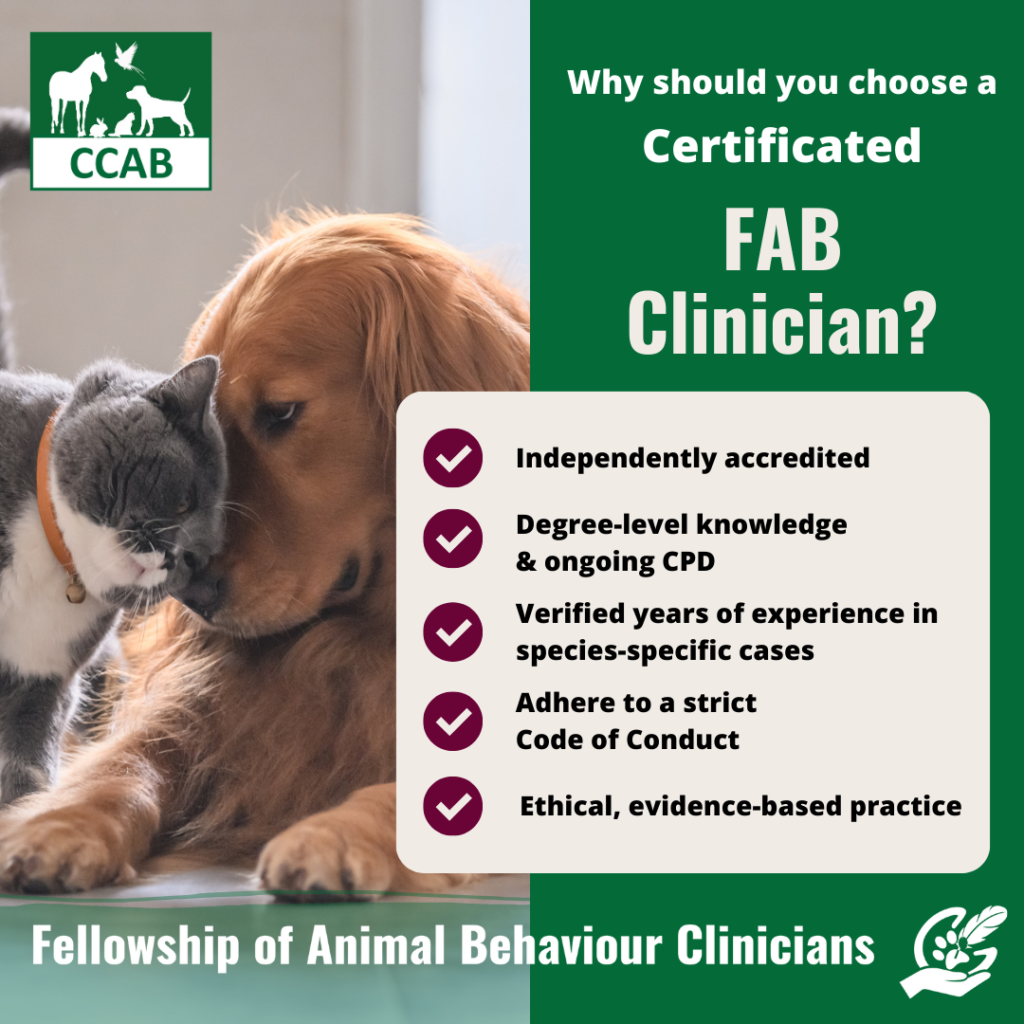
Our Certificated Members are either independently accredited CCABs in the UK, or are Diplomates or Fellows of the veterinary behaviour colleges in Europe, North America, South America and Australasia. This means they are assessed by organisations external to ours for at least degree-level knowledge in the field and a breadth of clinical skills in the requisite areas, with years of species-specific case experience in clinical behaviour practice.
Moreover, our members are checked annually by our independent accreditors for their ongoing learning and evidence-based practice, needing to demonstrate they are maintaining a significant caseload working to the highest ethical standards as part of the vet-led team. They all are bound by our Code of Conduct, which is supported by a transparent disciplinary process.
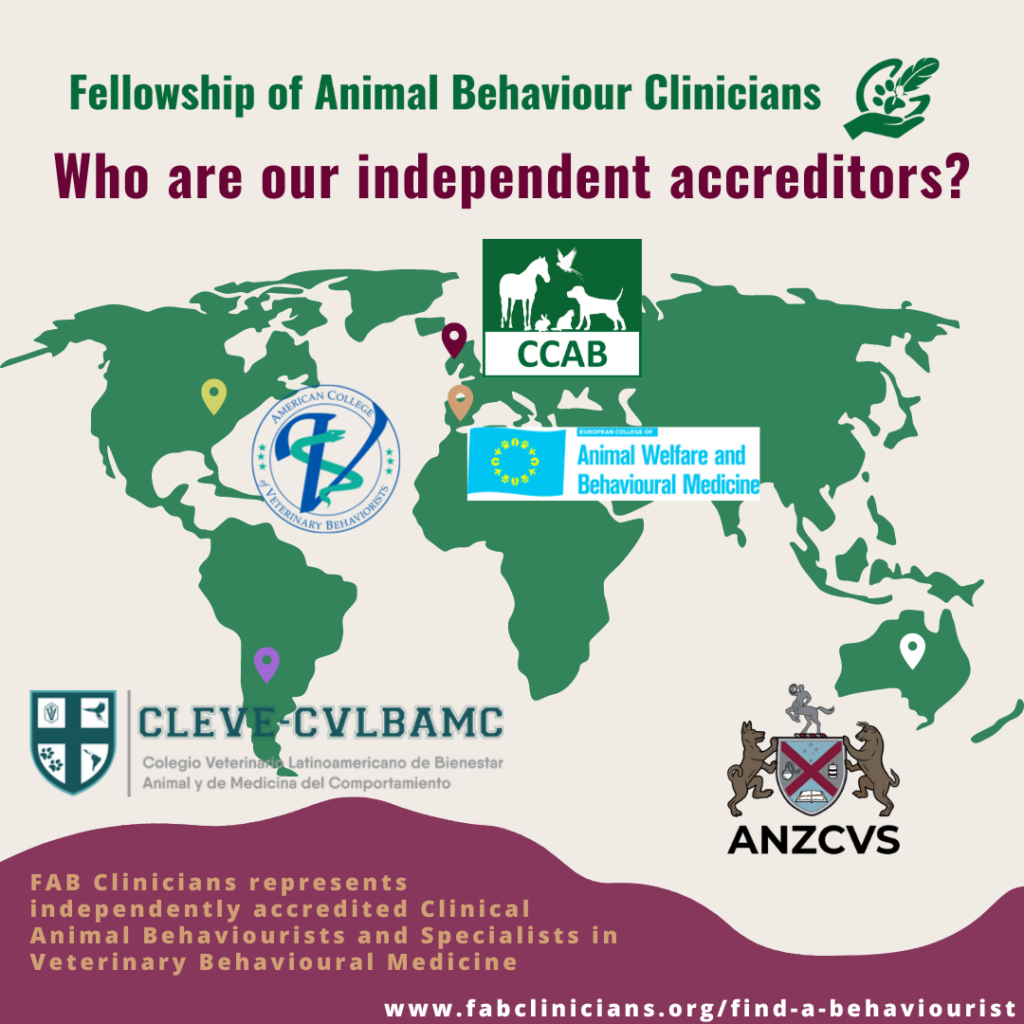
What can my clients and I expect from your members?
✓ Independently accredited high standards of qualifications, experience and ethical, evidence-based practice for each species the members work with, or members who are dedicated to working towards these standards.
✓ We only work on veterinary referral or delegation. If your client approaches one of our members directly before they have spoken to you about their pet’s behaviour, they will send them back to you for a clinical examination and onwards referral.
✓ First aid, prophylactic advice on cases and general CPD can often be provided to referring vet practices.
✓ Typically the initial behaviour consultation with your client lasts 1-3 hours and is conducted at the animal’s home or at a regional clinic.
✓ A report outlining the assessment and treatment is sent to the client and the referring vet.
✓ Ongoing support is provided in the following weeks/months either remotely or in-person. There is an ongoing exchange of information with the referring veterinary practice throughout management of problem behaviour.
✓ Each member is mindful of their personal scope of practice and do not attempt to practise beyond it.
Are all your members vets?
No – some of our practising members are not vets. All of our members are aware of the different but complementary roles Clinical Animal Behaviourists (CABs) and Veterinary Behaviourists (VBs) play, as well as how they can each support their referring veterinary team. We all follow a strict Code of Conduct and do not attempt practice beyond our scope of practice.
Can my clients claim on insurance?
Yes very likely! Most UK pet insurance policies allow behaviour work to be claimed for if conducted by a vet or a CCAB (of which all our UK-based Certificated Members are). Do bear in mind though that every individual animal’s policy is different.
What’s the difference between a behaviourist and a trainer?
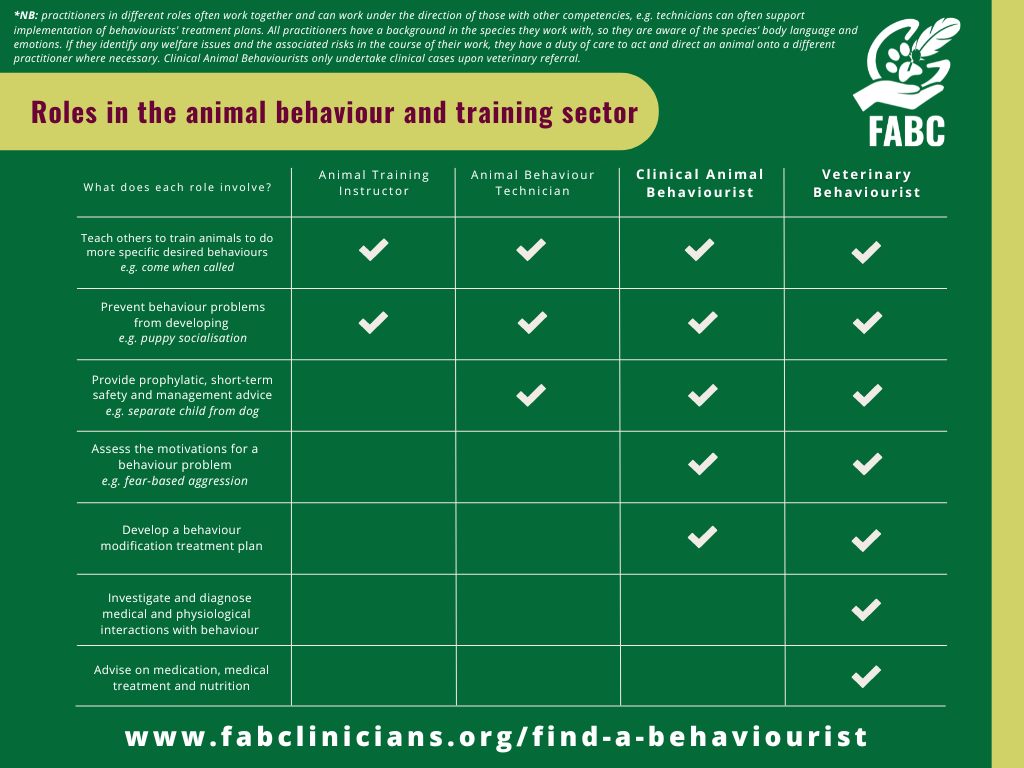
The role of a Clinical Animal Behaviourist is interconnected with, but different to Animal Training Instructors, who may for instance run group classes, or to Animal Behaviour Technicians, who usually provide more preventative advice to stop behaviour problems from developing in the first place.
A trainer will show an animal’s owner how to use rewards to teach the animal to enjoy doing certain activities on cue, such as recall, leadwork and tracking. Whereas a behaviourist is able to identify the emotions and causes for a particular behaviour problem. They show the owner how to help their animal not only teaching them how to behave differently, but primarily by teaching them how to feel differently.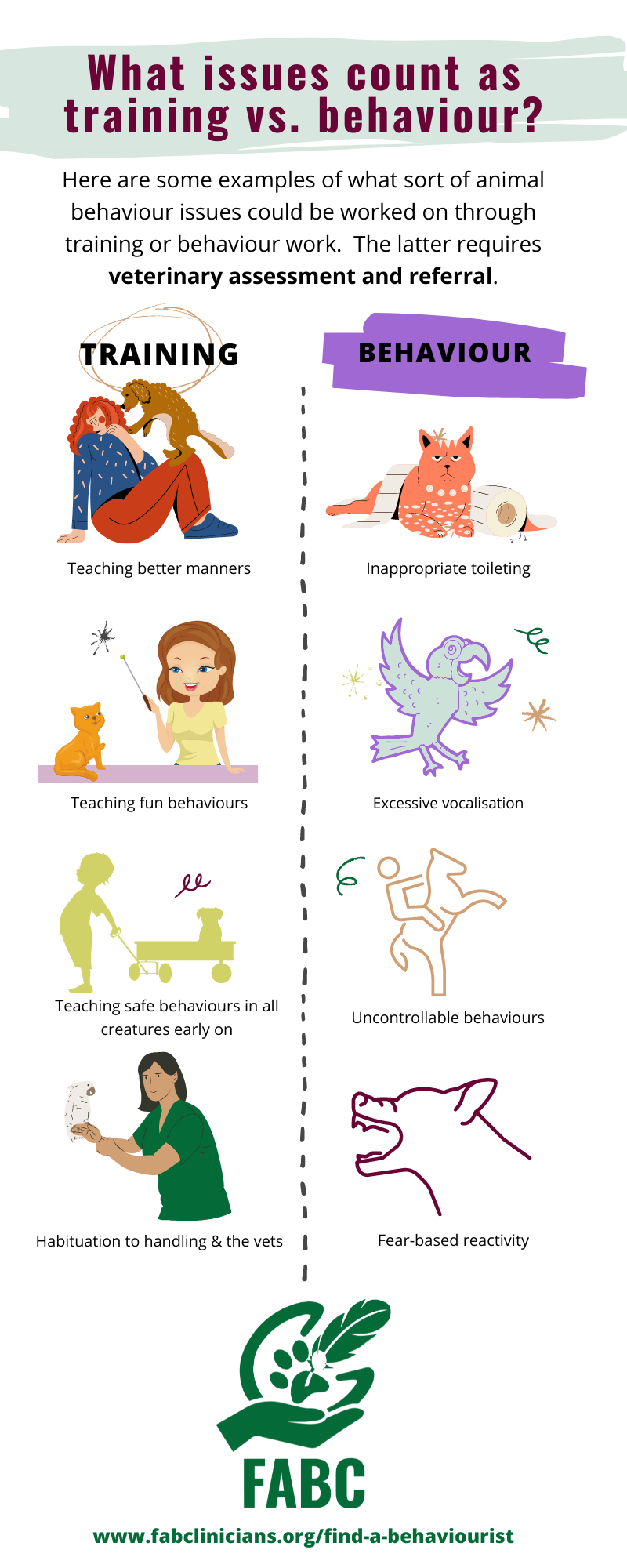
Anything that is beyond straightforward training, or providing prophylactic advice requires a veterinary assessment and then likely referral onto a Clinical Animal Behaviourist. One of our members may already have a relationship with some of your clients in a training capacity, but as soon as they realise one of your clients may have a behaviour issue, they may give first aid advice but then are bound by our Code of Conduct to direct your client back to you for a full medical check-up. All of our members will seek veterinary referral before proceeding to make an assessment or give advice regarding a behaviour modification plan.
When should I refer to a vet and when should I refer to a non-vet behaviourist?
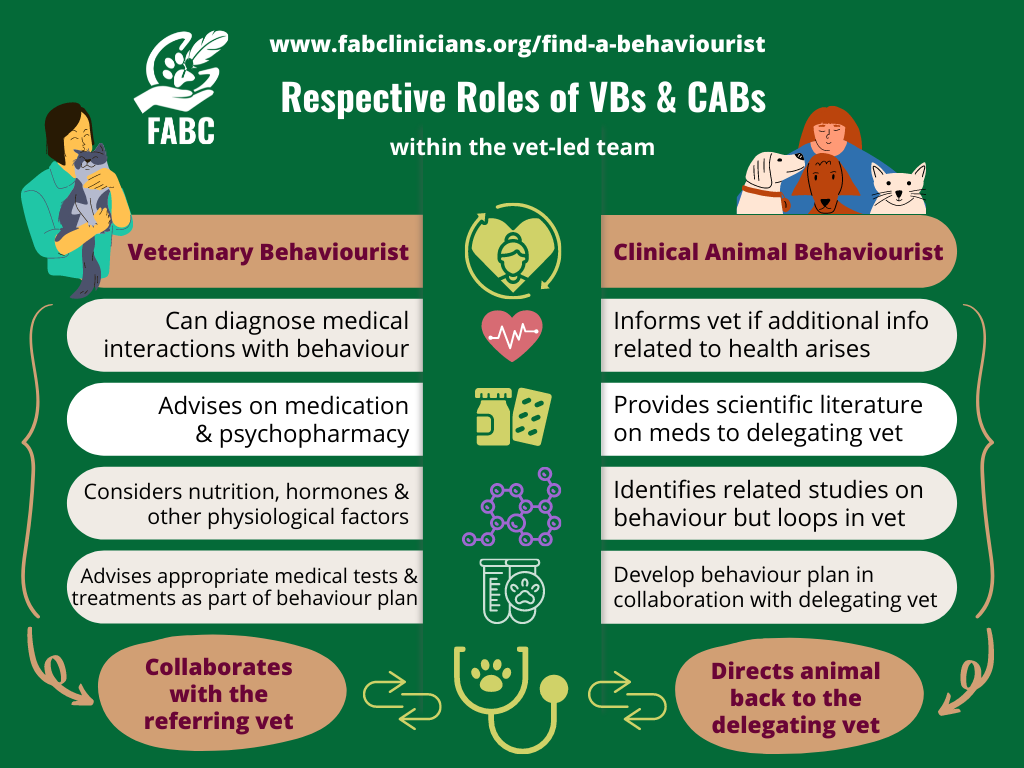
Where medical causes for unwanted behaviour cannot be eliminated or addressed by the referring vet, the ability to oversee prescription of psychoactive medications is not available within the referring veterinary team, or there are complex medical and behaviour co-morbidities, then referral should be made to an appropriately qualified Veterinary Behaviourist.
Our non-vet members may be able to identify the potential involvement of some form of medical issue for discussion with you as the referring vet, but they cannot legally or ethically make a diagnosis. Likewise, these members are bound by our Code of Conduct not to give any specific form of physical health-related advice to your clients without discussing this with you as the referring vet. Nonetheless, they should be able to discuss with you the impact of various forms of physical health on behaviour with reference to up to date scientific literature. This includes areas such as dietary modification, neutering, pheromonatherapy, or complementary products with active chemical ingredients.
Referring vets and Veterinary Behaviourists remain responsible for any psychoactive medications and minimising the risks of any side effects if prescribed. Our non-vet members may discuss adjunctive medical treatment of a behaviour case with you as the referring vet by referencing the current and established scientific literature, but they must not provide any advice on specific appropriate treatment, type or dose of medication. You or your practice may wish to consider becoming a FAB Sponsor: you would gain access to our research hub of behavioural medicine textbooks and scientific literature. Alternatively, any vet can email our office and request our behavioural medicine information sheets.
Do I remain responsible for overseeing the behaviour case, regardless of whom I refer it to?
Yes, you are overseeing all aspects of your patient’s treatment, including those aspects referred onto veterinary colleagues, or delegated to paraprofessionals. FAB Clinicians find the BVA view on the vet-led team helpful for consideration. As you are the animal’s normal, first-opinion vet, you remain its ‘hub’ for its welfare: you provide oversight and direction of the animal’s care, including management of its behaviour issues. After first examining the animal and identifying the reported problem, you then eliminate or address possible medical causes for the behaviour. Subsequently you may direct the behaviour care of the animal to the ‘behaviour spoke’ of the wheel (i.e. one of our vet/non-vet members). This member will then return cases back to you whenever further direction or collaboration is needed.
Note that any vet making a behaviour referral/delegation can only ever do so in good faith, based on what the vet knows of the behaviourist and what the behaviourist has told the vet of their stipulated level of expertise and experience. If the vet acts in good faith, then any professional mistakes made by the behaviourist will be the behaviourist’s own responsibility.
If I refer to a Veterinary Behaviourist, will they prescribe medication and provide emergency out-of-hours care if needed?
All Veterinary Behaviourists can provide advice about medication, but they all work differently. The individual you refer to will let you know how they work before taking on the case. Most of our vet members make clear in their agreements with their referring practices that prescriptions and out-of-hours care remains the responsibility of the referring practice. All our members make clear to their clients where emergency care can be sought, however it is provided.
Note that prescription by a Veterinary Behaviourist can only be done if they have seen animal in person and made a clinical assessment first. The physical examination may have occurred recently, or have occurred often enough for the Veterinary Behaviourist to have personal knowledge of the condition of the animal in order for them to able to make a diagnosis and prescribe. The animal cannot be under the care of the Veterinary Behaviourist if they have not physically examined the animal.
Can your vet and non-vet members work together?
Yes! Our members collaborate with each other in various ways, such as through our online members’ forums, which can be helpful to inform your judgement to direct case treatment. Some of our vet members offer a behaviour advice or support service for veterinary practices. Often this support is available to our non-vet members to discuss aspects of cases (with the referring vet’s and client’s permission). In such a scenario, the non-vet member can provide their first-hand behaviour assessment to the vet member and then act under the collaborative direction of the vet member and the referring vet.
For instance, sometimes the input of a Veterinary Behaviourist is needed partway through the treatment of a behaviour case, which has already been delegated to a non-vet behaviourist. Then our fellowship can facilitate cases where a previously unforeseen medical condition is identified, or unexpected circumstances develop requiring acute psychoactive medication.
What are your other types of members?
FAB Clinicians supports those working towards independent accreditation:
- Candidates have gained the theoretical knowledge necessary for undertaking clinical animal behaviour work, so they are currently gaining the necessary practical experience in each species they would like to be independently accredited in, often under the mentorship or supervision of Certificated Members. They include Residents of the above Veterinary Behaviour Colleges, those with CCAB Pre-Certification, or those who have achieved ABTC K&U standard for the CAB role. They adhere to our strict Code of Conduct and do not practise outside their competence. They are often supported in their work by Certificated Members.
- Students do not yet have the required academic knowledge to start clinical behaviour practice. As a minimum they need to be enrolled on a relevant FHEQ Level 5 course.
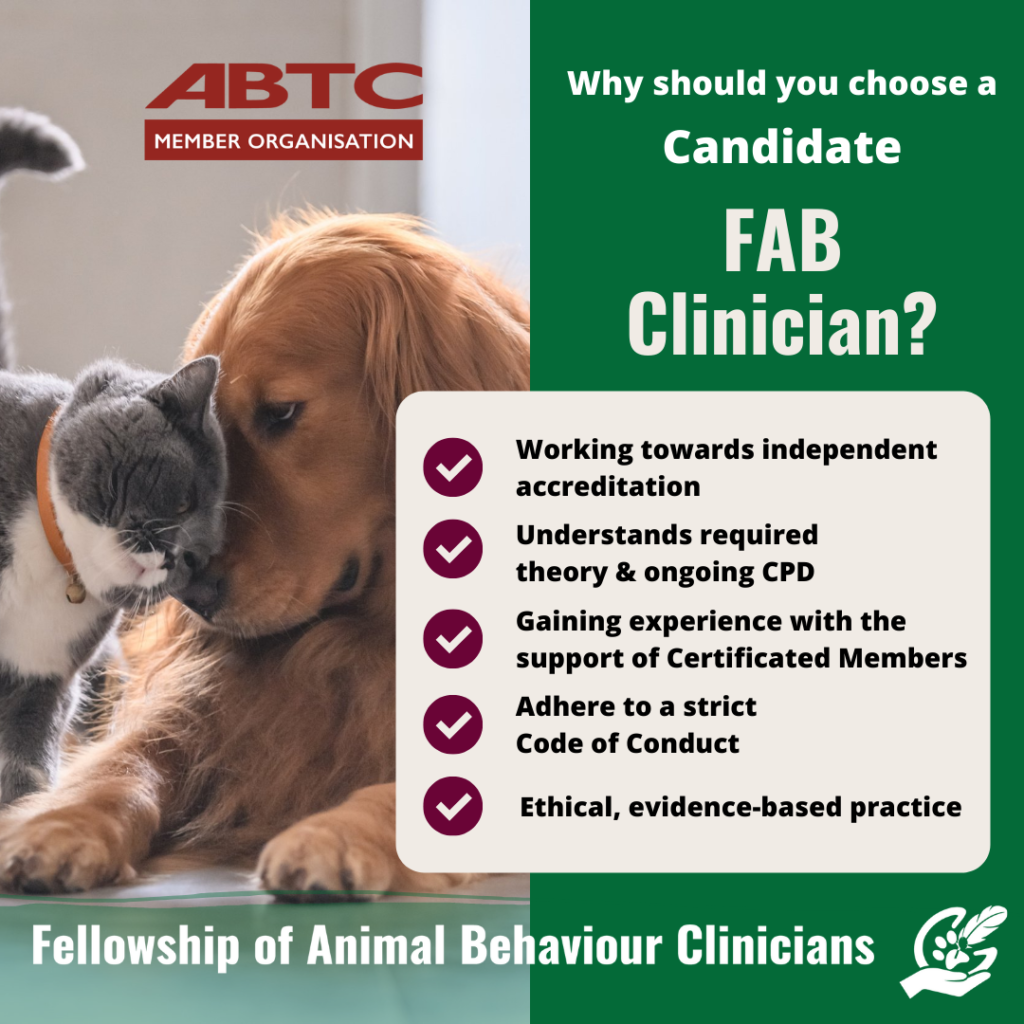
When clinicians accredited by one of our independent bodies choose to retire entirely from the profession, they may remain with FAB Clinicians as Retired Certificated Members.
We also have fantastic Contributing Supporter Members, who do not practise, but contribute to our mission statement in other ways, such as through research. Lastly, anyone can become a FAB Sponsor by financially contributing to our mission, but this does not make them eligible for membership.
What’s involved in a mentored or supervised consultation where there are students or candidates present?
In order to gain the practical skills and clinical experience necessary for independent accreditation, Candidate and Student Members sometimes sit in on the consultations of Certificated Members. All our members are bound by a strict Code of Conduct.
A Candidate Member may also consult on cases as the primary clinician, often under the observation and/or guidance of a Certificated Member as a supervising clinician. Note though that due to the nature of behaviour cases, the supervising clinician may not be present or even advising on every stage of a case through assessment, treatment and followup.
All our members work differently and have different forms of mentoring relationships with each other. Your local FAB Clinicians will advise you on how they work before they undertake a case referred from you.
Can I just get some general advice on my cases?
General advice about clinical animal behaviour may be given in response to a vet’s enquiry, or remotely in other ways, such as on a web site. Advice on general aspects or themes of a case can be given to an animal’s vet (e.g. common causes of sound sensitivities, or the likely effects of pain on behaviour). Our members should not comment on the specific details of cases without referral. They can however provide prophylactic advice (i.e. ‘teletriage’).
You are welcome to join in our free Q&As for vets. You’ll notice we also have a range of information sheets, video resources and webinars. If you email the office, you will also be able to access behavioural medicine information sheets for general practice vets. Alternatively, you can gain more knowledge through our research hub if you become a FAB Sponsor.
Can your members provide behavioural first aid advice?
Yes – our Certificated Members often provide preventative, prophylactic first aid advice over the phone to you or your clients (i.e. ‘teletriage’). A diagnosis/full assessment and prognosis cannot be made through teletriage. However, a preliminary assessment of the presenting signs, history and environment can be made to mitigate risk and prevent the problem from becoming worse through short term management advice. This will allow time for a full physiological investigation to take place, before behaviour referral can be made.
Do your members work remotely?
With the current COVID-19 situation, many of our members are providing remote behaviour consultations on veterinary referral – you can find them under the ‘Remote Consultations’ listing on our Find A Behaviourist page. This is according to the advice provided by our regulators, which can be viewed here.
Unfortunately, there are not always Veterinary Behaviourists geographically available to general practice vets and their clients. Many of our vet members provide a remote support advice service for veterinary practices as part of their normal service. In which case, they work remotely in collaboration with an animal’s first opinion vet and preferably with a locally accessible non-vet Clinical Animal Behaviourist. In certain circumstances our non-vet members can also conduct remote video consultations on veterinary referral. This is likely to become more than norm with developing technologies and legislative change (e.g. see RCVS consultations and AVMA telemedicine policies).
Often our members provide some follow-up sessions with your clients remotely, but conduct the initial behaviour assessment in person. Again the provision of these remote sessions is dependent on an individual animal’s needs and case factors.
What should I bear in mind if I would like to obtain specific case advice remotely? What are the limitations?
Remote behaviour consultations highlight the importance of the referring vet to maintain oversight of the behaviour diagnosis, treatment, compliance and outcome, as you are most appropriately placed with sufficient knowledge of the animal’s general health status and are the most readily available clinician for regular follow-up evaluation, continuing care and emergency care. If you would like to obtain specific behaviour case advice remotely, then a thorough clinical exam before referral and ongoing monitoring by you becomes all the more essential. Our members will ensure as far as possible that such advice does not compromise animal welfare. Where the member is a vet, the specific remote advice will only be provided to the extent appropriate without their own physical examination of the animal (even if via video link and with physiological data). It should also be clearly understood that any prescribing responsibility and provision of 24-7 emergency care remains with the referring vet in such circumstances.
FAB Clinicians leave it up to the professional judgement of each of our Certificated Members about whether individual cases are suited to in-person or remote consultations. We should be mindful of the limitations of operating through remote video behaviour consulting. Our members learn a great deal about clients and their animals’ behaviour through natural observation, which may be lost when working remotely. Often, they may be unable to offer as much tailored practical support as they normally would in person. Therefore, our members will modify the advice given according to the information available and needs of the individual case. In some cases, this means we will only be able to provide first aid advice until a face-to-face consultation is possible. Our members will consider the following case factors:
- Potential level of risk and types of risk involved;
- Consequences for animal welfare;
- Nature of behaviours being addressed;
- Type of species;
- Individual circumstances for the animal, their carers and the member themselves.
What if one of my clients discusses a veterinary concern with one of your non-vet members?
The non-vet member always remains mindful of working as part of the vet-led team under your direction and they will never practise outside their own professional competencies. If they identify a potential physiological component to a behaviour problem, they will discuss this with you as the referring veterinary surgeon and act according to your direction. In some instances, non-vet behaviourists may feel that onward referral to a veterinary specialist or to a Veterinary Behaviourist is indicated. If your client discusses a veterinary concern with one of our non-vet members, then they will advise the client to discuss their concerns with you, or they may offer to speak with you on their behalf.
What was your response to the recent RCVS consultation on legislative reform?
We strongly support the recommendations of the Legislative Working Party, particularly ‘Part 1: embracing the vet-led team’ and regulating paraprofessionals. In the best interests of animal welfare, we believe Clinical Animal Behaviourists should be accredited by an independent body, which is external to any professional body representing behaviourists. This body should check for sufficient qualifications, experience, ongoing CPD and caseload in each species the clinician works with. Our response to the RCVS consultation can be read in full here.
What if I have a concern about one of your members?
In the first instance, you are welcome to contact us at office@fabclinicians.org . Alternatively, our disciplinary and complaints procedure is detailed here in Section 6.
How can I learn more about behaviour?
FAB Clinicians is committed to providing high quality CPD and educational materials for veterinary professionals and the wider animal care community. Your local FAB Clinician member will very likely be able to provide your practice with behaviour CPD if you wish it. We also regularly run a variety of webinars, conferences and free Q&A sessions specifically for veterinary staff, most of which are recorded to suit your busy schedules.
In the meantime, feel free to use our information handouts and video resources for your clients. If you email the office, you will also be able to access behavioural medicine information sheets for general practice vets.
If you or your practice become a FAB Sponsor, you and your colleagues will be able to access all these webinars at no extra costs, as well as access our digital library of textbooks and online repository of thousands of full-text papers in peer-reviewed academic journals.
What is your position on potential regulation of the animal behaviour and training sector?
FAB Clinicians strongly supports regulation of the animal behaviour and training sector. We believe it is vital for animal welfare for behaviourists to be independently accredited and to have high standards of academic knowledge and clinical experience. In the UK, we support the associate model of regulation, where it is proposed that the RCVS would directly regulate clinical animal behaviourists. Further details can be found in our position statement here.
Why is the CCAB accreditation scheme no longer part of the ABTC?
FAB Clinicians is a member organisation of the ABTC, which aims to be the umbrella body for the animal behaviour and training sector. We also support our UK-based members towards independent, external accreditation and assessment by the CCAB accreditation scheme.
In 1998, the Association for the Study of Animal Behaviour (ASAB), a learned society, established a working party to examine the need for a professional framework for people working in applications of animal behaviour in the UK. This working party included representatives from the British Psychological Society, the Royal College of Veterinary Surgeons (RCVS), the International Society for Applied Ethology, as well as what is now the British Veterinary Behaviour Association, and a range of professional organisations representing behaviourists. The working party concluded that in the best interests of the public, practitioners, vets and other related professions, a registration scheme, independent of education providers and professional bodies, was required to avoid conflicts of interest and safeguard animal welfare.
This led to the formation of the CCAB accreditation scheme, which was set up and administered by an Accreditation Committee under the umbrella of ASAB, with a longer-term goal that, at some point, the accrediting organisation would become independent. In 2023, the ASAB Council and the ASAB Accreditation Committee mutually agreed that the time had come, and CCAB Certification Ltd was formed as a separate, independent non-profit organisation. The remit and standards of CCAB Certification remain unchanged.
When the ABTC was first set up in 2010, its CAB standards were based on the CCAB standards. Recent initiatives by the ABTC resulted in changes to how theoretical knowledge is assessed. For the CCAB accreditation scheme to remain part of the ABTC, they would have needed to change the acceptance criteria for CCAB application, which were not in line with their values. Thus in April 2023 ASAB and the Accreditation Committee opted to maintain their criteria and operate independently as CCAB Certification. Specifically, it was felt the required theoretical knowledge should be assessed independently and met predominantly via academic study, with the ability to meet a few criteria via Accreditation of Prior Experiential Learning (APEL). Further details can be sought here.
What Drives Us
Our Mission
To promote evidence based behavioural support for animals and their carers, to the highest scientific standards, in an empathetic and compassionate manner.
To forge strong links between animal carers, behaviourists and veterinary professionals.
To support the development of independently accredited practitioners in the field of clinical animal behaviour through mentoring, continuing professional development and supportive fellowship.
